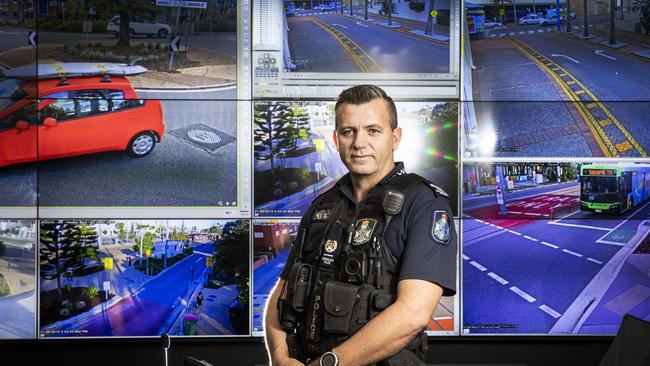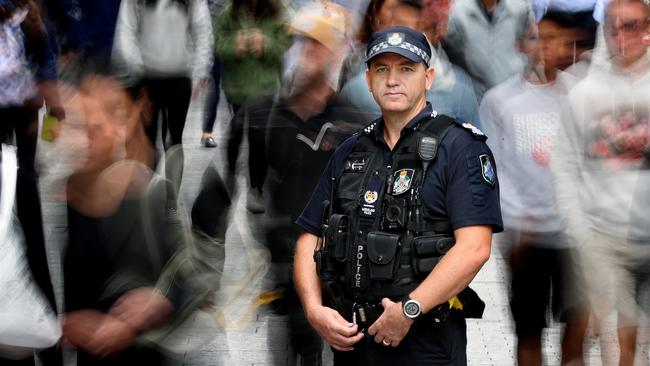Super-recognisers: The Qld police who never forget a face
Police with superhuman facial recognition abilities have now made 1000 identifications in major Queensland crimes. Are you a super-recogniser? TAKE THE TEST
Police & Courts
Don't miss out on the headlines from Police & Courts. Followed categories will be added to My News.
Police with superhuman facial recognition abilities have now made 1000 identifications in major Queensland crimes including murder investigations, rapes and robberies.
The team of “super-recognisers” specialise in making identifications by reviewing CCTV but also by remembering images in mugshot databases, or faces they have seen years earlier.
They’ve also been used in major events as a tool for rapid identification.
The extraordinary and unexplained ability to remember faces – which just 1 to 2 per cent of the population have – is the opposite of prosopagnosia, known as face-blindness.
The team is led by Senior Sergeant Chris Tritton who was the first officer in Queensland to be identified as a super-recogniser after he was tested by the University of Greenwich and University of New South Wales and found to be in the top one per cent of the population for facial recognition.

When CCTV is uploaded, teams will either recognise people from previous identifications or they will run the image through facial recognition software before having to manually find a match from up to 300 people provided.
“When we first started we had a rape investigation that had been filed, they couldn’t identify the person,” Sen Sgt Tritton said.
“They sent us the image and in a couple of minutes we had identified a person of interest. We just provide a name and they will utilise traditional methods, catch up with a person.”
Sen Sgt Tritton said super-recognisers maintained an “internal memory catalogue” by working across crimes across the state.
“I’ve identified a lady in Roma and it was eight months later she came up in footage in Beaudesert and the second I saw her I knew I had identified her before,” he said.
“The more we are having exposure the more we are building our catalogue.
“You’ll see advertised that super-recognisers don’t forget a face, well that’s not true you couldn’t possibly store every image but we have a much better recognition than a regular person.”
The Met Police in London started using super-recogniser after the 2011 London Riots, with officer Gary Collins identifying 190 people.
ARE YOU A SUPER-RECOGNISER? TAKE THE TEST HERE OR HERE
They were also credited with helping identify two Russian intelligence officers who poisoned Sergei Skripal and his daughter in England with weapons-grade nerve agent Novichok.
Sen Sgt Tritton said super-recognisers from London’s Met foiled a potential acid attack at last year’s Notting Hill Carnival after police were given information about a planned incident.
He said he and his team took a “holistic look” when viewing images.
“That triangle from the eyes and the nose and the top of the mouth, that sort of centred area is an instant,” he said.
“But that first gut feeling comes from an initial glance. It’s really not focusing on any one feature.
“Once you’ve got that you move on to the really reliable traits like ears.”
“We look at hair growth patterns, colouring in a beard, the style for growth some people have – some people grow right up to their bottom lip – they are all stable identifiers that we use.”
Sen Sgt Tritton said brain-related research was still being done on how super-recognisers had the ability but researchers believed the talent was likely hereditary.

While officers were originally sceptical he said the team were now accepted by colleagues.
Sen Sgt Tritton said people with the ability learnt to stop telling people they had previously seen them.
“I was with my sister one time and she introduced me to a friend of hers and just off the cuff I said you were on my flight to Sydney two weeks ago,” he said.
“And he was straight away, he was straight away ‘who are you, how do you know where I was going?’
“You later realise maybe it’s not a good idea to keep telling people I know you from somewhere, I’ve seen you in the street.”
Six of his super-recognisers took part in an international proficiency test last year and was found to be the most accurate of any other law enforcement and counter terrorism organisations.
While there are about 20 accredited super-recognisers working in the southeast and in North Queensland, there would be up to 300 in the Queensland Police Service, Sen Sgt Tritton said.
He hopes to eventually test the entire workforce with the Greenwich University and expand the group.
They plan to work at all major events such as the Olympics, on the ground or watching live CCTV feeds that need policing.
Sen Sgt Tritton was awarded an honorary fellowship to the association of super-recognisers in London in December.




